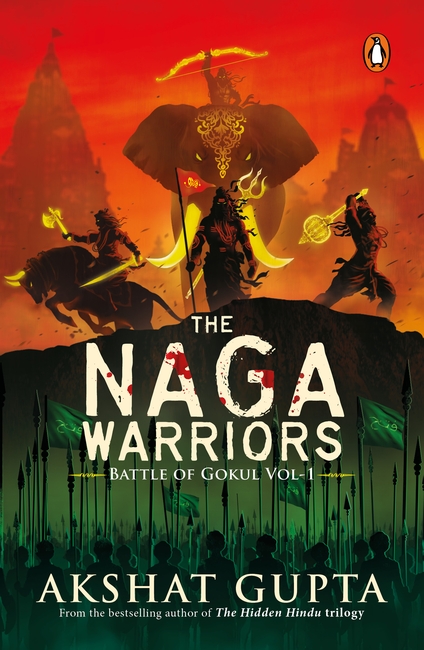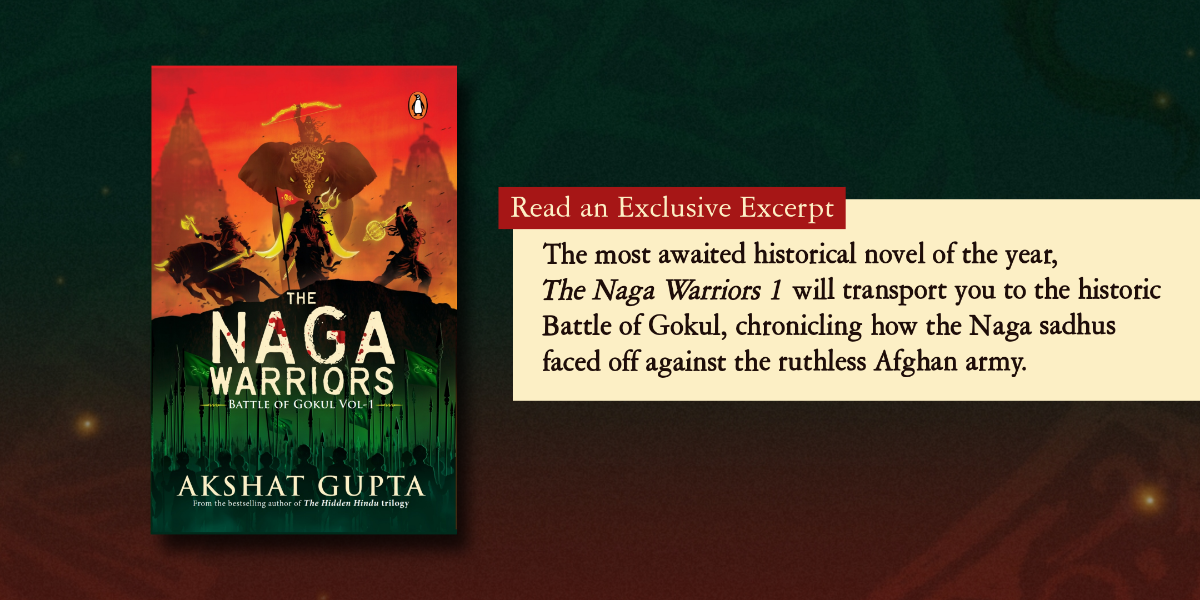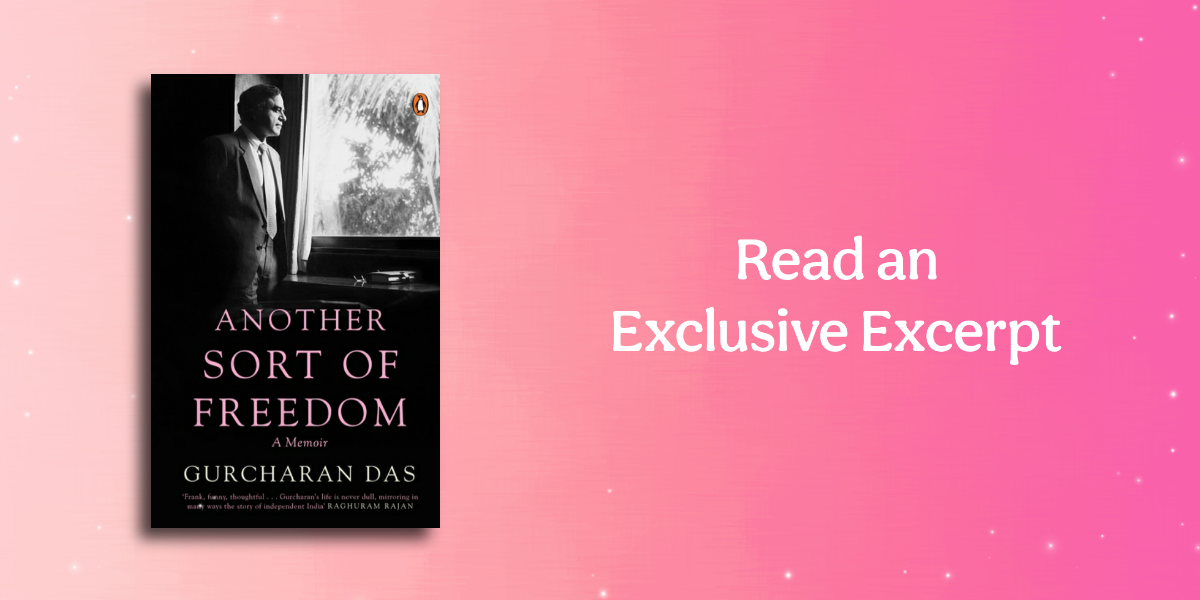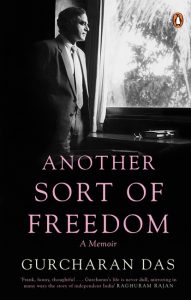National bestselling author, Akshat Gupta returns with another gripping series, The Naga Warriors: The Battle of Gokul Volume 1, where legends come to life and heroes are forged. Journey deep into the heart of Gokul, where the echoes of Krishna’s miracles still ring, and the Naga warriors stand as the guardians of Dharma against the forces of darkness.
Read this exclusive excerpt to embark on an adventure like no other!

***
‘Was Gokul a special place, then?’ asked the hiker, Thomas.
‘Gokul is still a special place and will remain so till the end of the world,’ replied the nameless Naga with a smile on his face.
‘What’s so special about this place Gokul?’
The nameless Naga continued: A place that earned its salvation by Lord Krishna’s hands himself will always be special. In the ancient town of Gokul, there lived a cruel king named Kans. His rule was marked by fear and suffering as he imposed heavy taxes and subjected the people to his ruthless whims. Yet, little did Kans know that his reign of terror was destined to meet its end.
A prophecy had foretold the birth of a child who would be his demise. That child was none other than Lord Krishna, the divine avatar of Vishnu. Krishna’ s parents, Devaki and Vasudeva, were locked away in a prison cell by Kans, as it was prophesied that their eighth child would bring about his downfall. Each time Devaki gave birth, Kans mercilessly took the child and ended its life. However, when Krishna was born, a divine intervention occurred. Miraculously, the prison doors opened, and Vasudeva was able to carry the newborn Krishna to safety across the raging Yamuna River to the village of Gokul. There, he exchanged Krishna with a baby girl, Yashoda’ s daughter, and returned to the prison without arousing suspicion. Later, when Kans came to kill the baby girl, she flew from his hand, revealed herself as Maya and vanished after telling Kans that his death was inevitable.
Krishna grew up in Gokul as a cowherd, endearing himself to everyone with his charm, mischief and divine exploits. As he matured, his extraordinary powers became evident and his reputation as the embodiment of grace and righteousness spread far and wide. When Kans learn t of Krishna’s existence and the prophecy, he unleashed a series of demons and wicked schemes to eliminate the divine child. Krishna fearlessly faced each challenge, defeating demons like Putana, Trinavarta and Keshi. Finally, the day of reckoning arrived. Krishna, having come-of-age, confronted Kans in a mighty showdown. With his divine strength and cunning, Krishna overpowered Kans and cast him from his throne. The prophecy had come true, and Gokul was freed from Kans’s oppressive rule.
Krishna’s birth and his victory over Kans became a symbol of hope and divine intervention for all, a reminder that righteousness and courage would always triumph over tyranny. Krishna’s legacy endured, and his teachings on love, morality and devotion continue to inspire countless souls to this day. Even in the 1750s, this divine connection was evident in every aspect of Gokul Houses made of mud and straw lined the narrow, unpaved streets, their walls often adorned with colourful murals depicting scenes from Krishna’s childhood. As one walked the complicated pathways, the aroma of incense and freshly cooked meals wafted out from windows, creating a heady mix of scents. The centre of Gokul was dominated by majestic havelis and temples, each more intricate and richly decorated than the last. The temples were characterized by their towering shikharas and bore the fine craftsmanship of the region, with intricate carvings and delicate work. The continuous tolling of temple bells added to the rhythmic chanting of prayers and the soulful melodies of devotional songs were a constant backdrop to the hustle and bustle of everyday life. Thanks to the nourishing Yamuna, the town was wrapped in an emerald quilt of fertile farmland. Many residents were engaged in farming and animal husbandry, with herds of cattle being a common sight. The daily life of Gokul in the 1750s was naturally tied to the rhythm of nature. Despite being a small town, Gokul was a melting pot of cultures. The music of birds chirping and cows mooing and the vibrant colours of the textiles created a lively atmosphere, as if Krishna still lived there.
The region’ s local traditions were harmoniously interwoven with influences from across the country, brought in by the many pilgrims and travellers who visited this holy town. Festivals, especially those related to Lord Krishna, were grand affairs celebrated enthusiastically, transforming the village into a spectacle of lights, colours and joyous revelry. Life in Gokul in the 1750s was humble and simple, yet imbued with a profound sense of spirituality and community. Amid the rhythm of daily chores and routines, a sense of calm and peace prevailed, underpinned by the town’s unshakeable faith in the divine.
***
Get your copy of The Naga Warriors by Akshat Gupta on Amazon or wherever books are sold.









